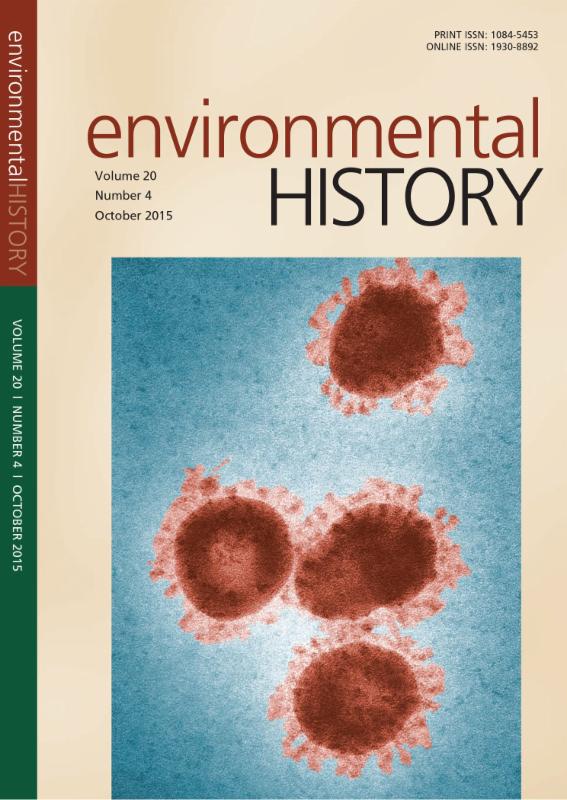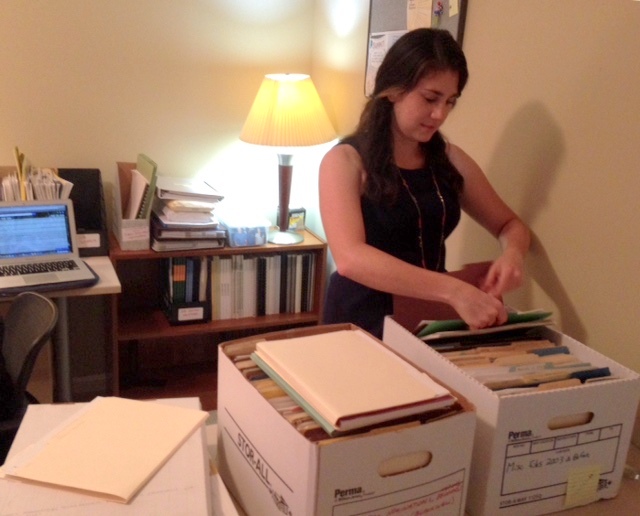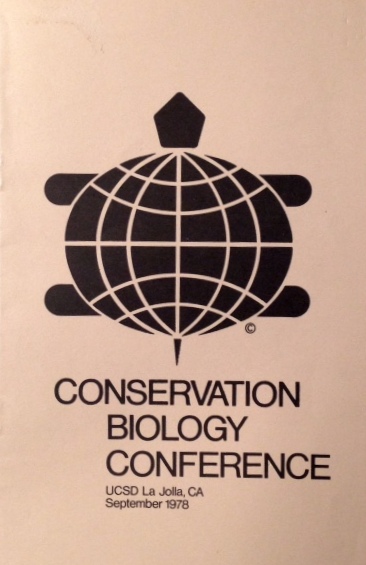|
|

|
fall 2015
volume 26, issue 3
|
|
|
update on 2016 conference
|
|

If you submitted a proposal to present at our 2016 conference - thank
you! Our program committee has been evaluating the submissions and is
very close to creating a program. We will contact you with the results
within the next few weeks.
Our 2016 conference will include the following events:
- 2 plenary
sessions - one on Teaching Environmental History and one on
Contextualizing Western Drought
- 100
sessions
- workshop
on publishing
- Forest
History Society lunch featuring speaker Douglas
Brinkley
- 5
receptions, where you can meet friends and colleagues
- exhibit
area with more than 40 tables, where you can talk to editors and
view the latest scholarship in environmental history
- "meet
the environmental history professionals" table providing
info. and advice on career development
- 14 field
trips on Friday afternoon and Sunday
Click
here for general info. on the conference, including hotel
reservations and a list of fees.

|
|
national park service centennial and aseh
|
|
In honor of the centennial of the National Park Service,
ASEH's conference will feature sessions on the national parks and
public lands as well as a free brown bag lunch featuring Audrey Peterman, author
of Legacy on the Land, and Glenn Nelson, author of
recent NY Times
piece "Why
Are Our Parks So White?"
We have also organized 2 day trips for April 3: Ebey's
Landing National Historical Reserve on Whidbey Island and Olympic
National Park.
|

|
|
Above: NPS field trips will include a tour of the Elwa
River Dam removal site in Olympic National Park, pictured above.
|
|
|
publishing workshop
|
|
Our 2016 conference will
 feature
a publishing workshop on March 30, sponsored by the University of
Washington Press. Details will be available on ASEH's conference
website later this fall. feature
a publishing workshop on March 30, sponsored by the University of
Washington Press. Details will be available on ASEH's conference
website later this fall.
|
|
|
|
A limited number of travel grants are available for
students and low-income scholars presenting at our 2016 conference.
Please note that membership in ASEH is required for applying. Click
here for more information.
|
|
|
Seattle
March 30-April 3, 2016
Interested in hosting a
future ASEH conference? Contact director@aseh.net
|
|
|
|

The October issue of Environmental
History includes a forum on Technology, Ecology, and Human
Health Since 1850, along with articles on Grizzly Adams, colonial North
India, tourism boosters in California and Florida, and more. Click here for
additional information.
|
|

Our 2016 conference will include a field trip to the
Snoqualmie Falls Hydroelectric Plant, and a visit to the underground
cavity and generating station (pictured above).
|
|

|
|
Our field trips will include a birding trip to
Discovery Park, pictured above - featuring a walk through a forest
grove and along a beach.
|
|
|

|
|
Our 2016 conference will include an environmental
justice tour (by boat) of the Duwamish River (pictured above).
|
|
|

|
|
Four walking tours of downtown Seattle will be
offered during our conference.
|
|
|

|
|
Our 2016 conference will include a boat tour of Lake
Union and the ship canal and locks (pictured above).
|
|
|

|
|
Our day trip to Ebey's Landing National Historical
Reserve will include a stop at the historic town of Coupeville
(pictured above) for Penn Cove mussels.
|
|
|

|
|
Our 2016 conference will offer a day trip to Ebey's
Landing (pictured above).
|
|
|

|
|
|
from the archives
|
|

Tom Dunlap donated a 1984 document to ASEH's archives
that shows membership distribution. This graphic (above)
demonstrates that we had global membership even back then. Click
here to view a larger, readable version of the membership map.
|
|
|
|
Published quarterly by the American Society for
Environmental History. If you have an article, announcement, or an item
for the "member news" section of our next newsletter, send to
director@aseh.net
by December 11, 2015.

|
|
|
president's
column: climate change, ethics, and politics
"The earth, our home, is beginning to look more
and more like an immense pile of filth." With blunt statements
such as this one, Pope Francis's encyclical, or teaching document,
offers a firm embrace of mainstream science on climate change and its
causes, while reminding us that the issue is inherently linked to
economic injustice. Thus, Francis contends, climate change is not
only an environmental matter; it is an ethical crisis.
"Laudato Si" ("Praise Be to You")
contends that the human burning of fossil fuels has rendered
"unprecedented destruction of ecosystems, with serious
consequences for all of us," but the poorest and the poorest
nations experience its most dire consequences. While raising no new
scientific questions for the members of this organization, it is
the first papal encyclical devoted solely to environmental issues.
Moreover, it offers a powerful critique of unchecked global
capitalism and the inequities it has engendered.
Francis also observes, "It is remarkable how weak
international political responses have been. The failure of global
summits on the environment makes it plain that our politics are
subject to technology and finance. There are too many special
interests, and economic interests easily end up trumping the common
good . . ." Whether this encyclical will help to break through
such logjams when UN summits on climate change and sustainable
development convene at the end of the year remains to be seen.
What was as striking as the Pope's bold statement was
the scant attention paid to the issue of climate change in first
two presidential debates. Only three candidates addressed it for
perhaps five minutes in the second debate despite the fact that
this contest took place in drought-ridden, wildfire-plagued
California. The fault, however, lay as much with the moderators who
failed to ask probing questions on the subject. Despite the Pope's
encyclical, despite the global calamity that is well afoot, despite
the thousands of lives arguably lost in human-exacerbated
disasters, the media continues to give climate change sporadic,
limited attention.
ASEH, on the other hand, hopes to bring these various
issue to the fore at its upcoming meeting in Seattle. In addition
to other provocative sessions, the program committee led by Chair
Brett Walker has organized a plenary session, "Contextualizing
Western Drought." I hope that you will join us in March 2016
for Environmental History and its Publics.
Finally, in my December 2015 column, I would like to
address a special form of giving - mentoring. Mentoring occurs in
many different ways in our profession. For example, 18 people
participated in ASEH's mentoring program this past year; you can
learn more about it at http://aseh.net/resources/for-students/aseh-mentoring-program.
I would love to hear your ideas about mentoring generally and
within ASEH in particular. Thank you!
|
|
the profession:
report on aseh's 2015 internship
by Rachel Jacobson, North Carolina State University
Editor's note: This year, ASEH
partnered with the Smithsonian Conservation
Biology Institute and the Society for Conservation Biology to
offer a student internship for an environmental history archives
project, which includes the identification, collection and
processing of primary documents associated with the history of
conservation biology. Among these are materials from the early
years of the Society for Conservation Biology, an international
professional organization founded in 1985, and from the Smithsonian
Conservation Biology Institute, a leading international
conservation research center.
 As a Master's Candidate in Public History with a
primary focus in environmental history, it has been rewarding to
get the first look at some of the SCB documents that have not been
reviewed in over a decade and to decipher how the collection would
best be organized. Aside from the opportunity to work with
interesting content, getting to work with scientists and historians
from the SCB, ASEH, and the Smithsonian Conservation Biology
Institute is exciting, as it is unusual to work with so many
partners in a single project. As a Master's Candidate in Public History with a
primary focus in environmental history, it has been rewarding to
get the first look at some of the SCB documents that have not been
reviewed in over a decade and to decipher how the collection would
best be organized. Aside from the opportunity to work with
interesting content, getting to work with scientists and historians
from the SCB, ASEH, and the Smithsonian Conservation Biology
Institute is exciting, as it is unusual to work with so many
partners in a single project.
Eventually these records will become available to
environmental historians,  ecologists, biologists, public policy professionals,
and anyone else who may benefit from access. Thus far, I have seen
documents on conservation biology conferences, public policy
discussions, and outreach to environmental organizations. In
addition to ecologists, biologists, public policy professionals,
and anyone else who may benefit from access. Thus far, I have seen
documents on conservation biology conferences, public policy
discussions, and outreach to environmental organizations. In
addition to
getting the SCB papers archived and accessioned, our project has
another goal of creating a streamlined process for gathering and
organizing conservation biology documents and artifacts. Improving
records management systems will help any organization improve
institutional memory, help to prevent the loss of records, and help
meetings run more smoothly. I am grateful to the ASEH and its
partners for this opportunity.
|
|
member
news
Cody Ferguson published This is Our Land: Grassroots Environmentalism in
the Late Twentieth Century (Rutgers University Press).
Robert R.
Gioielli published Environmental Activism and the Urban Crisis
(Temple University Press).
The following ASEH members recently
received fellowships from the American Council of Learned Societies:
Kate Brown, University of
Maryland, for "Chernobyl Revisited: An Historical Inquiry into
the Practice of Knowing"
Maura Capps, Maura,
University of Chicago, "All Flesh is Grass: Cultivation as
Conservation in Britain's Settler Empire, 1780-1850"
Bathsheba Demuth, University of
California-Berkeley, "The Power of Place: Modern Ideology and
Arctic Ecology in the Bering Straits, 1848-1988"
Congratulations to all!
|
Final Notice - ASEH awards submissions
ASEH will offer the following awards in 2016. Click on
the links for application requirements - all submissions are due on
November 16, 2015.
Click
here for information on the George Perkins Marsh Prize for best
book in environmental history
Click
here for information on the Alice Hamilton Prize for best
article outside journal Environmental
History
Click
here for information on the Rachel Carson Prize for best
dissertation in environmental history
Please note that authors published in our journal Environmental History
will automatically be considered for the Leopold-Hidy Prize for
best article; no need to submit anything.
Service and Achievement Awards:
The Distinguished Service Award is presented every
year to an individual who has contributed significantly to the
development of ASEH as an organization; membership in ASEH is
required. Click here
for a link to the brief form to submit for nomination.
ASEH's Public Outreach Project Award is presented to
an environmental history project that engages the
public. Eligible nominees include films, exhibitions, historic
preservation, archaeology, community programs, and other similar
work. Scholarly articles and books are excluded. The project should
have been presented or initiated (if it is ongoing, such as a
website or blog) between January 2014 (when our last award was
selected) and the fall of 2015. Nominations may be made by anyone,
including those associated with the project. Click
here for submission instructions.
Final Notice - ASEH Samuel P. Hays Fellowship
Applications
It is open to practicing historians (either academic,
public, or independent). Graduate students are ineligible. A Ph.D.
is not required. Funding is for 2016.
To apply, please submit the following items:
- A
two-page statement (500 words) explaining your project and how
you intend to use the research funds.
- A c.v.
no more than two pages in length.
All items for the Samuel P. Hays Research Fellowship
must be submitted electronically to director@aseh.net by November 16, 2015.
Final Notice - ASEH Hal Rothman Fellowship Applications
Students enrolled in any Ph.D. program worldwide are eligible to
apply. Funding is for 2016.
To apply, please submit the following three items:
- Two-page
statement (500 words) explaining your project and how you
intend to use the research funds.
- A c.v.
no more than two pages in length.
- A
letter of recommendation from your graduate advisor
All items for the Hal Rothman Research Fellowship must
be submitted electronically to director@aseh.net by November 16, 2015.
Newberry Library Fellowships
 ASEH has partnered with the Newberry Library in
Chicago to offer an annual research fellowship. Membership in ASEH
required. Click here
for more info. Deadline
for application: December 15, 2015. ASEH has partnered with the Newberry Library in
Chicago to offer an annual research fellowship. Membership in ASEH
required. Click here
for more info. Deadline
for application: December 15, 2015.
Currently there are several tenure-track positions for
environmental history and environmental studies posted on ASEH's
website (Boston College, Brown University, Bowdoin College, Drexel,
University of Oregon, and more). Click here to
view.
ASEH Mentoring
Program
ASEH conferences are known for their friendliness and
collegiality - a characteristic enhanced by our mentoring/hosting
program. Would you like to introduce a student or new professional
to our conference by meeting with them in Seattle and explaining
our events and including them in some of your discussions?
If you are interested in serving as a mentor or in
being a mentee, please contact director@aseh.net by March 1, 2016.
Indicate your preference (mentor or mentee) and we
will match people before the conference and send them one another's
contact info.
Note: If you are a non-academic mentor willing to talk
about your work and if you are a student or new professional
who would like to talk with a non-academic mentor in Seattle,
please indicate that preference as well.
|
Events at 2016 Conference
ASEH's Graduate
Student Caucus has organized a session on career development and a
workshop on writing. Anyone can attend the career development
session. To sign up for the writing workshop contact Ian J. Jesse
at ian.jesse@umit.maine.edu by January 10, 2016.
Grad Student Liaison Position Available
ASEH's
Graduate Student Caucus invites applicants for the position of
Graduate Student Liaison to the Executive Committee for the year
2016.
ASEH will provide the recipient with a $500 USD travel subsidy to
attend the ASEH annual meeting in Seattle in late March/early April
2016. Attendance at the executive committee meeting (Saturday,
April 2) is required, as is consulting with graduate students and
the graduate student caucus throughout the year. The term of the
position runs from January 1 to December 31, 2016.
To apply for this position, please submit a one-page statement
describing your interest in this position, including information
regarding previous participation in ASEH activities and/or
leadership and service experience. Please also submit a short c.v.
(maximum three pages).
Applications should be sent via email to Daniel Soucier, current
ASEH Graduate Student Liaison (Daniel_Soucier@umit.maine.edu). The deadline for
applications is November 16, 2015.
Note that to vote in this election one must be a current member of
the ASEH Graduate Student Caucus. Membership in the caucus is
simple! To join, please send a statement of interest to the current
liaison, Daniel Soucier at Daniel_Soucier@umit.maine.edu.
Also
note that graduate students can apply for both the liaison position
and an ASEH travel grant, but they can receive only one for travel
to the 2016 conference.
|
|
film
review: a culture of commitment
By Mike Dockry, USDA Forest Service
"A Culture of Commitment: Indian Forestry,"
produced by Upstream
Productions, is a primer on American Indian forestry.
The film juxtaposes historical photographs with interviews with
tribal forest managers, academics, and US government officials. It tracks
Indian forestry from the late 1800s through the present and argues
that it is a model of sustainable forestry for the US. The
interview participants show us that American Indian tribes have
managed their forests for millennia and since the 1900s, tribes
have been pushing the US government to allow them to harvest timber
and manage their forests to achieve tribal goals. From federal
legislation in 1910 that allowed American Indian tribes to harvest
live trees, through the 1990 National Indian Forest Resources
Management Act, we hear how tribal forestry is an extension of
tribal self-determination and sovereignty and how forestry has been
a way for tribes to protect and restore their forestlands while
sustaining their people.
The film neglects a larger body of historical
scholarship that could have provided better context for
understanding Indian forestry and its relationship with the
progressive era; the history of the US Forest Service and
Department of the Interior; and the interplay among the civil
rights, environmental, and the American Indian movements of the
1960s and 1970s. The film could have also explained more
about the Intertribal Timber Council. These omissions remind us
that there is a dearth of scholarly research on American Indian
forest management and that this is fertile ground for future
environmental history scholarship.
The film's greatest strength is in highlighting the
historically marginalized voices of American Indian people and
their forest managers as they discuss and explain their own values,
forest management goals, and views on the importance of American
Indian forestry. The film shows over a dozen tribes and includes
compelling interviews with forest managers and leaders from the
Menominee Nation in Wisconsin, the Hoopa Valley Tribe in
California, the Quinault Indian Nation in Washington, the Coquille
Indian Tribe in Oregon, and the Confederated Tribes of Siletz
Indians in Oregon. There are also interviews with former Bureau of
Indian Affairs "Chief Foresters," the author of a
detailed history of Indian forestry (Newell et al. 1986), and
Indian Forest Management Act Assessment Team members (see http://www.itcnet.org/issues_projects/issues_2/forest_management/assessment.html).
In the end, the film reminds us that American Indian
forest management is an important component of the history of
forestry in the US and has been an important component of tribal
sovereignty.
|
|
|
|
|
|
|
|
|
|
|
aseh news is a publication of the
American Society for Environmental History
Officers:
Kathleen Brosnan, University of Oklahoma, President
Graeme Wynn, University of British Columbia, Vice
President/President Elect
Mark Madison, U.S. Fish and Wildlife Service, Treasurer
Jay Taylor, Simon Fraser University, Secretary
Executive Committee:
Sarah Elkind, San Diego State University
Emily Greenwald, Historical Research Associates,
Inc.-Missoula
Christof Mauch, Rachel Carson Center
Kathryn Morse, Middlebury College
Cindy Ott, St. Louis University
Ellen Stroud, Bryn Mawr College
Paul Sutter, University of Colorado
Ex Officio, Past Presidents:
Gregg Mitman, University of Wisconsin-Madison
John McNeill, Georgetown University
Harriet Ritvo, Massachusetts Institute of Technology
Ex Officio, Editor, Environmental
History:
Lisa Brady, Boise State University
Ex Officio, Executive Director and Editor, aseh news:
Lisa Mighetto, University of Washington-Tacoma
Ex Officio, Graduate Student Liaison:
Daniel Soucier, University of Maine
|
|
|
|
|



















